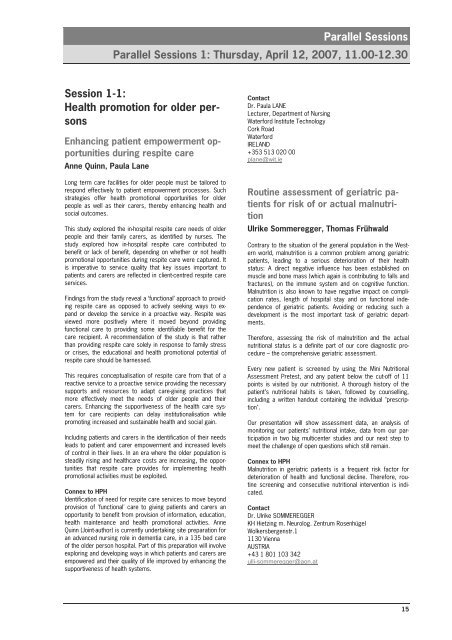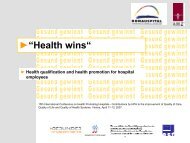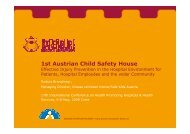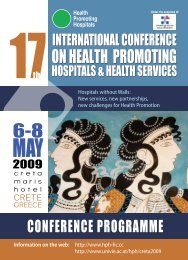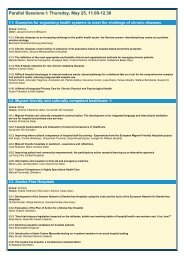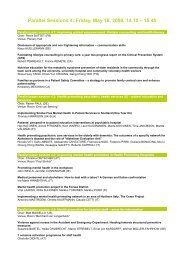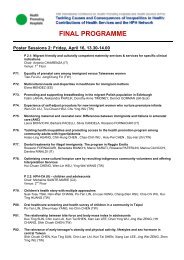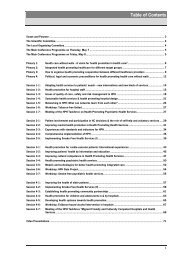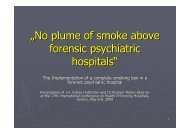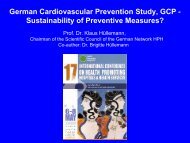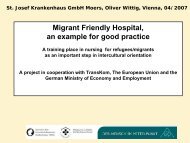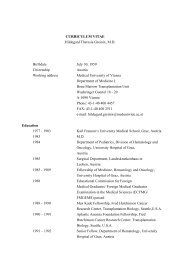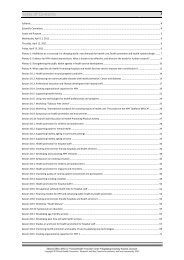Plenary 1: The Hospital – A Staff Empowering ... - HPH-Conference
Plenary 1: The Hospital – A Staff Empowering ... - HPH-Conference
Plenary 1: The Hospital – A Staff Empowering ... - HPH-Conference
Create successful ePaper yourself
Turn your PDF publications into a flip-book with our unique Google optimized e-Paper software.
Parallel Sessions<br />
Parallel Sessions 1: Thursday, April 12, 2007, 11.00-12.30<br />
Session 1-1:<br />
Health promotion for older persons<br />
Enhancing patient empowerment opportunities<br />
during respite care<br />
Anne Quinn, Paula Lane<br />
Long term care facilities for older people must be tailored to<br />
respond effectively to patient empowerment processes. Such<br />
strategies offer health promotional opportunities for older<br />
people as well as their carers, thereby enhancing health and<br />
social outcomes.<br />
This study explored the in-hospital respite care needs of older<br />
people and their family carers, as identified by nurses. <strong>The</strong><br />
study explored how in-hospital respite care contributed to<br />
benefit or lack of benefit, depending on whether or not health<br />
promotional opportunities during respite care were captured. It<br />
is imperative to service quality that key issues important to<br />
patients and carers are reflected in client-centred respite care<br />
services.<br />
Findings from the study reveal a ‘functional’ approach to providing<br />
respite care as opposed to actively seeking ways to expand<br />
or develop the service in a proactive way. Respite was<br />
viewed more positively where it moved beyond providing<br />
functional care to providing some identifiable benefit for the<br />
care recipient. A recommendation of the study is that rather<br />
than providing respite care solely in response to family stress<br />
or crises, the educational and health promotional potential of<br />
respite care should be harnessed.<br />
This requires conceptualisation of respite care from that of a<br />
reactive service to a proactive service providing the necessary<br />
supports and resources to adapt care-giving practices that<br />
more effectively meet the needs of older people and their<br />
carers. Enhancing the supportiveness of the health care system<br />
for care recipients can delay institutionalisation while<br />
promoting increased and sustainable health and social gain.<br />
Including patients and carers in the identification of their needs<br />
leads to patient and carer empowerment and increased levels<br />
of control in their lives. In an era where the older population is<br />
steadily rising and healthcare costs are increasing, the opportunities<br />
that respite care provides for implementing health<br />
promotional activities must be exploited.<br />
Connex to <strong>HPH</strong><br />
Identification of need for respite care services to move beyond<br />
provision of 'functional' care to giving patients and carers an<br />
opportunity to benefit from provision of information, education,<br />
health maintenance and health promotional activities. Anne<br />
Quinn (Joint-author) is currently undertaking site preparation for<br />
an advanced nursing role in dementia care, in a 135 bed care<br />
of the older person hospital. Part of this preparation will involve<br />
exploring and developing ways in which patients and carers are<br />
empowered and their quality of life improved by enhancing the<br />
supportiveness of health systems.<br />
Contact<br />
Dr. Paula LANE<br />
Lecturer, Department of Nursing<br />
Waterford Institute Technology<br />
Cork Road<br />
Waterford<br />
IRELAND<br />
+353 513 020 00<br />
plane@wit.ie<br />
Routine assessment of geriatric patients<br />
for risk of or actual malnutrition<br />
Ulrike Sommeregger, Thomas Frühwald<br />
Contrary to the situation of the general population in the Western<br />
world, malnutrition is a common problem among geriatric<br />
patients, leading to a serious deterioration of their health<br />
status: A direct negative influence has been established on<br />
muscle and bone mass (which again is contributing to falls and<br />
fractures), on the immune system and on cognitive function.<br />
Malnutrition is also known to have negative impact on complication<br />
rates, length of hospital stay and on functional independence<br />
of geriatric patients. Avoiding or reducing such a<br />
development is the most important task of geriatric departments.<br />
<strong>The</strong>refore, assessing the risk of malnutrition and the actual<br />
nutritional status is a definite part of our core diagnostic procedure<br />
<strong>–</strong> the comprehensive geriatric assessment.<br />
Every new patient is screened by using the Mini Nutritional<br />
Assessment Pretest, and any patient below the cut-off of 11<br />
points is visited by our nutritionist. A thorough history of the<br />
patient’s nutritional habits is taken, followed by counselling,<br />
including a written handout containing the individual "prescription".<br />
Our presentation will show assessment data, an analysis of<br />
monitoring our patients’ nutritional intake, data from our participation<br />
in two big multicenter studies and our next step to<br />
meet the challenge of open questions which still remain.<br />
Connex to <strong>HPH</strong><br />
Malnutrition in geriatric patients is a frequent risk factor for<br />
deterioration of health and functional decline. <strong>The</strong>refore, routine<br />
screening and consecutive nutritional intervention is indicated.<br />
Contact<br />
Dr. Ulrike SOMMEREGGER<br />
KH Hietzing m. Neurolog. Zentrum Rosenhügel<br />
Wolkersbergenstr.1<br />
1130 Vienna<br />
AUSTRIA<br />
+43 1 801 103 342<br />
ulli-sommeregger@aon.at<br />
15


